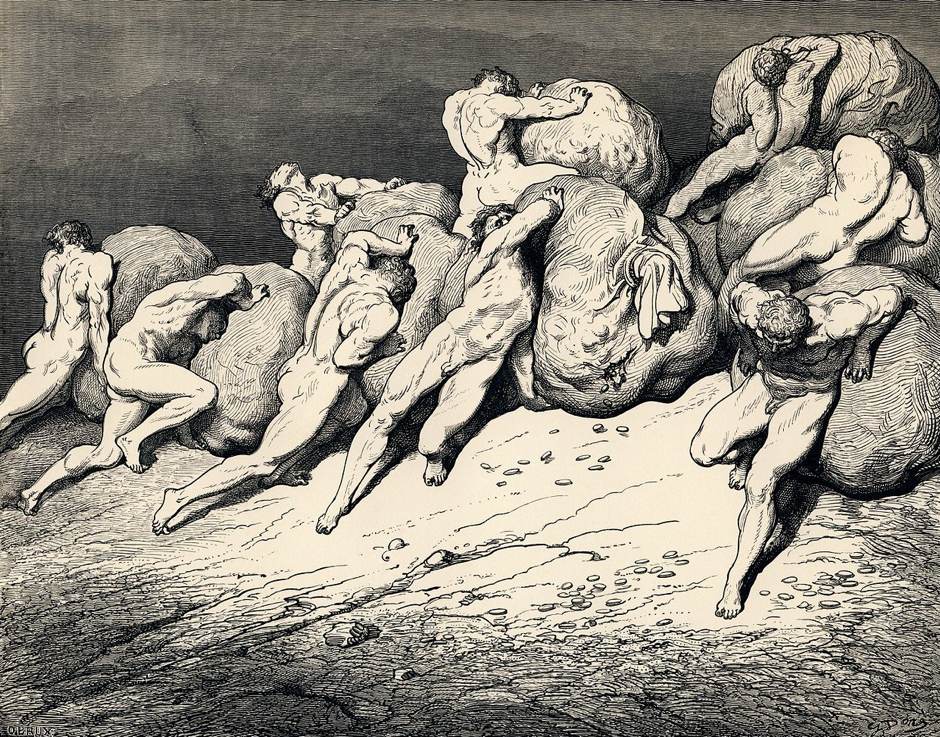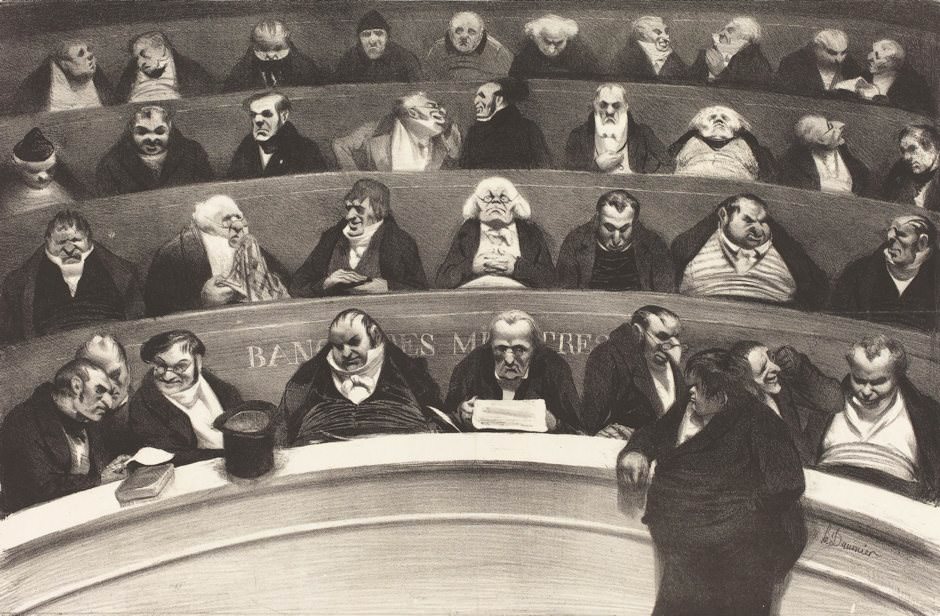If I were asked what was the greatest problem in the university I work in today, I would definitely say bureaucracy: in particular, the obsession with codifying, regulating, recording, reviewing, verifying, vetting, and chronicling, with assessing achievement, forecasting achievement, identifying weak points, then establishing commissions for planning strategies for regular encounters to propose solutions to weak points, and further commissions empowered to apply for funding to pay for means to implement these solutions, and so on. I am presently involved, for example, in two huge projects: one to give the Italian government an absolutely exhaustive description of the degree course in which I teach and one to give the same, but in response to a different set of questions and assumptions, to the European Commission. We are talking hundreds of pages and hours upon hours that could far more usefully be spent helping students, correcting their essays, and preparing lessons.
Needless to say our university is not alone in devoting time to such activities. Nor are universities special in this regard. Nor is Italy, where I live, for all its genius for bureaucracy, any worse than the UK or the USA in this matter (indeed my dealings with both the States and Britain suggests they may be worse). If ever, in conversation, you try to present your own place of work as an extreme case and yourself a supreme victim of bureaucracy, you can be secure the person you are talking to, whatever field he works in, will trump your story. What we have then is a propensity in modern life to substitute cataloguing and recording for actual doing, to create for ourselves an illusion of responsible action by endlessly multiplying the work, so-called, that precedes and—in the rare cases where it actually occurs—follows responsible action.
Literature, of course, is implacably opposed to bureaucracy. Isn’t it? Here is Dickens in Little Dorrit (the chapter is called CONTAINING THE WHOLE SCIENCE OF GOVERNMENT) castigating the British Treasury Office, which he renames the Circumlocution Office:
The Circumlocution Office was (as everybody knows without being told) the most important Department under Government. No public business of any kind could possibly be done at any time without the acquiescence of the Circumlocution Office. Its finger was in the largest public pie, and in the smallest public tart. It was equally impossible to do the plainest right and to undo the plainest wrong without the express authority of the Circumlocution Office. If another Gunpowder Plot had been discovered half an hour before the lighting of the match, nobody would have been justified in saving the parliament until there had been half a score of boards, half a bushel of minutes, several sacks of official memoranda, and a family-vault full of ungrammatical correspondence, on the part of the Circumlocution Office.
This glorious establishment had been early in the field, when the one sublime principle involving the difficult art of governing a country, was first distinctly revealed to statesmen. It had been foremost to study that bright revelation and to carry its shining influence through the whole of the official proceedings. Whatever was required to be done, the Circumlocution Office was beforehand with all the public departments in the art of perceiving—HOW NOT TO DO IT.
For a dozen pages the concept of how not to do something and the mysteries of this policy’s universal “implementation” are thoroughly explored. Some of the observations will be all too familiar to anyone living in a democracy:
It is true that every new premier and every new government, coming in because they had upheld a certain thing as necessary to be done, were no sooner come in than they applied their utmost faculties to discovering How not to do it. It is true that from the moment when a general election was over, every returned man who had been raving on hustings because it hadn’t been done, and who had been asking the friends of the honorable gentleman in the opposite interest on pain of impeachment to tell him why it hadn’t been done, and who had been asserting that it must be done, and who had been pledging himself that it should be done, began to devise, How it was not to be done. It is true that the debates of both Houses of Parliament the whole session through, uniformly tended to the protracted deliberation, How not to do it. It is true that the royal speech at the opening of such session virtually said, My lords and gentlemen, you have a considerable stroke of work to do, and you will please to retire to your respective chambers, and discuss, How not to do it. It is true that the royal speech, at the close of such session, virtually said, My lords and gentlemen, you have through several laborious months been considering with great loyalty and patriotism, How not to do it, and you have found out; and with the blessing of Providence upon the harvest (natural, not political), I now dismiss you. All this is true, but the Circumlocution Office went beyond it.
Dickens was not the only one to launch such attacks. It’s hard to think of a major writer—Tolstoy, Dostoevsky, Balzac, Zola, Flaubert, Kafka, Joyce, Lawrence—who hasn’t at some point or other satirized bureaucracy. So why has such writing produced no results? This is Orwell, himself no mean satirist of the British civil service, commenting on Dickens:
In Oliver Twist, Hard Times, Bleak House, Little Dorrit, Dickens attacked English institutions with a ferocity that has never since been approached. Yet he managed to do it without making himself hated, and, more than this, the very people he attacked have swallowed him so completely that he has become a national institution himself. In its attitude towards Dickens the English public has always been a little like the elephant which feels a blow with a walking-stick as a delightful tickling. Before I was ten years old I was having Dickens ladled down my throat by schoolmasters in whom even at that age I could see a strong resemblance to Mr. Creakle, and one knows without needing to be told that lawyers delight in Sergeant Buzfuz and that Little Dorrit is a favourite in the Home Office. Dickens seems to have succeeded in attacking everybody and antagonizing nobody. Naturally this makes one wonder whether after all there was something unreal in his attack upon society.
Orwell treats Dickens as if he were a special case, but the question he raises here is whether all satire isn’t to some extent in connivance with the object of its attacks. After all, hasn’t Orwell’s own 1984 become almost an official text in the country that has more surveillance cameras per citizen than any other in the world? Leaving England, Thomas Bernhard, another ferocious critic of his state, became fascinated by the extent to which people actually lapped the criticism up, applauded him for berating them. In the play Am Ziel (which might be translated Arrived) the lead character, who is simply designated The Writer, remarks of his successful play:
I can’t understand
why they applauded
we are talking about a play
that exposes every one of them
and in the meanest way
admittedly with humor
but nasty humor
if not with malice
true malice
And all of a sudden they applaud.
Years later, commenting on the controversy surrounding Bernhard, the East German playwright Heiner Müller said, “He writes as if he had been hired by the Austrian government to write against Austria… The disturbance can be articulated that loudly and clearly because it doesn’t disturb.”
So could it be—and this is the question I really want to ask—that however much literature may appear to be opposed to bureaucracy and procrastination, it actually partakes of the same aberration? Balzac’s Comedie humaine with his declared ambition to “compete with the civil registry”; Proust’s monstrous, magnificent Recherche, which he likened to a cathedral, tediously extending the analogy to every section of the work; Joyce’s encyclopaedic aspirations in Ulysses, his claim that Finnegans Wake would be a history of the entire world. Or go back to Dante, if you like, and his need to find a pigeonhole in hell for every sinner of every category from every sphere of society. Or fast forward again to Bouvard and Pécuchet, Flaubert’s two incompetents who react to practical failure by becoming obsessive copiers of literary snippets. This without mentioning the contenders for the Great-American-Novel slot, so eager to give the impression that their minds have encompassed and interrelated everything across that enormous continent (one thinks of the interminable lists of contemporary paraphernalia in Franzen’s writing). In each case, however different in tone and content the texts, life is transformed into a series of categories, made more mental, more a matter of words and intellect; we revel in the mind’s ability to possess the world in language, rather than to inhabit it or change it.
And of course all these literary achievements are wonderful and “enriching” (as they say) and infinitely more attractive than the dull documents I and my colleagues are compiling to describe our degree course to the European Commission; nevertheless they share with that document and with the people who devised it the desire for a control that stands off from participation, and perhaps substitutes for it: the desire to turn the world into words, page numbers, segments. Similarly, the windy length of his denunciation of the Circumlocution Office, and the lingering pleasure Dickens evidently takes in blowing it away, share that office’s sinister vocation, which is why, as Orwell says, the bureaucrats themselves recognize and love the spirit of the passage. One almost feels it’s worth having a Circumlocution Office so Dickens can describe it. A dangerous state of mind.
Advertisement
The question arises: Is all locution inevitably circumlocution (as Beckett tended to think), and will the West perhaps slowly and voluptuously choke itself in a mounting tangle of red tape, meantime entertaining itself to death with a mountain of literature that describes and charmingly castigates the whole scandalous process? Wouldn’t it be strange, in the end, if there were not a continuity of vocation between these two major facets of the same culture? Here am I, after all, writing about other people writing about things, and with a little luck some other blogger will respond on some other blog site castigating me for my cynicism and irresponsibility, since we all know that literature, like democracy (and most of all the British democracy that gave us the Circumlocution Office), must always be praised to high heaven.





